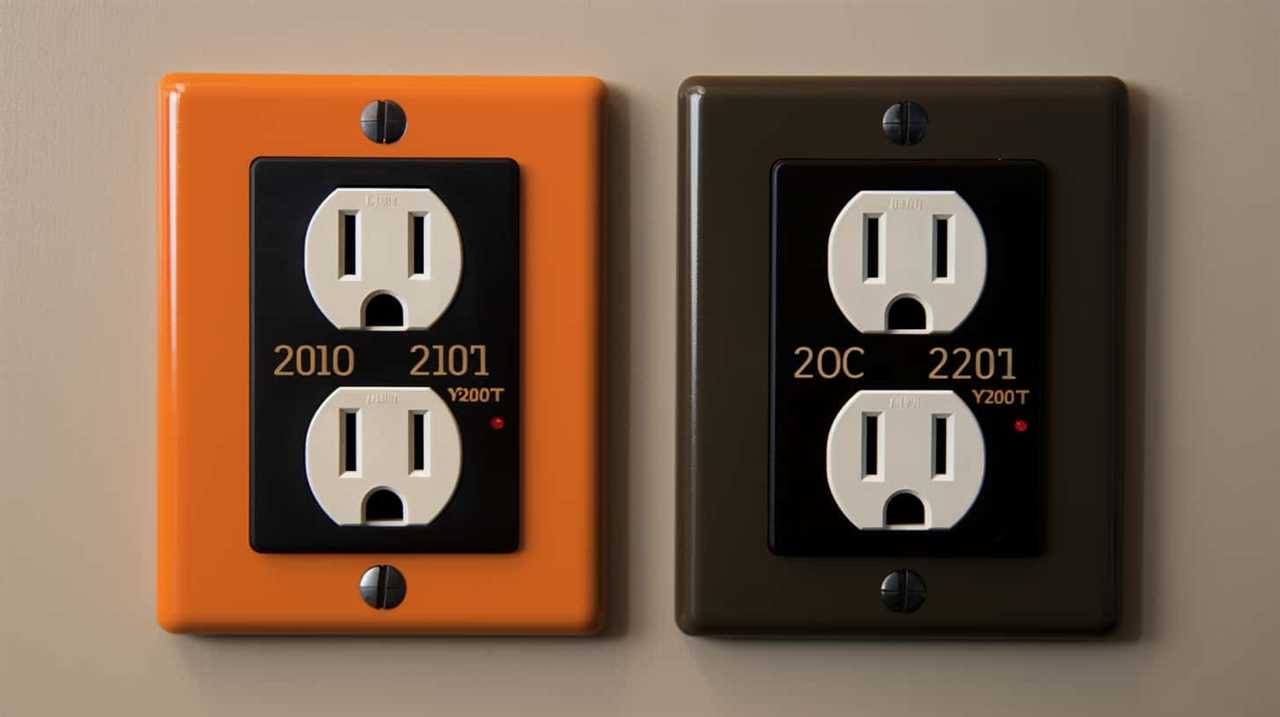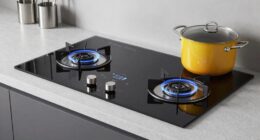As seasoned professionals in the field of property value, we have explored the inquiry: does upgrading appliances raise the value of your home? In this article, we will examine the influence of modern appliances on your home’s worth, taking into account market trends, age, and condition.
We will also guide you through popular upgrades that add value and offer insights on choosing the right appliances. Join us as we explore the role of warranties and alternative ways to boost your home’s value.
Key Takeaways
- Up-to-date appliances enhance home value and functionality.
- Energy-efficient appliances save homeowners money and contribute to a sustainable lifestyle.
- Growing demand for homes with updated appliances.
- Well-maintained and fully functional appliances positively influence resale value.
The Importance of Up-to-Date Appliances
Up-to-date appliances play a crucial role in enhancing our home’s value and functionality.
In today’s market, homebuyers are increasingly looking for homes with modern and efficient appliances.

Keeping up with current appliance trends is essential for homeowners who want to maximize the value of their property.
Energy efficient options are particularly popular, as they not only save homeowners money on utility bills, but also contribute to a more sustainable and eco-friendly lifestyle.
Homeowners should consider investing in appliances with Energy Star ratings, which indicate that they meet strict energy efficiency standards.
These appliances not only appeal to environmentally conscious buyers, but also demonstrate a commitment to reducing energy consumption and carbon footprint.
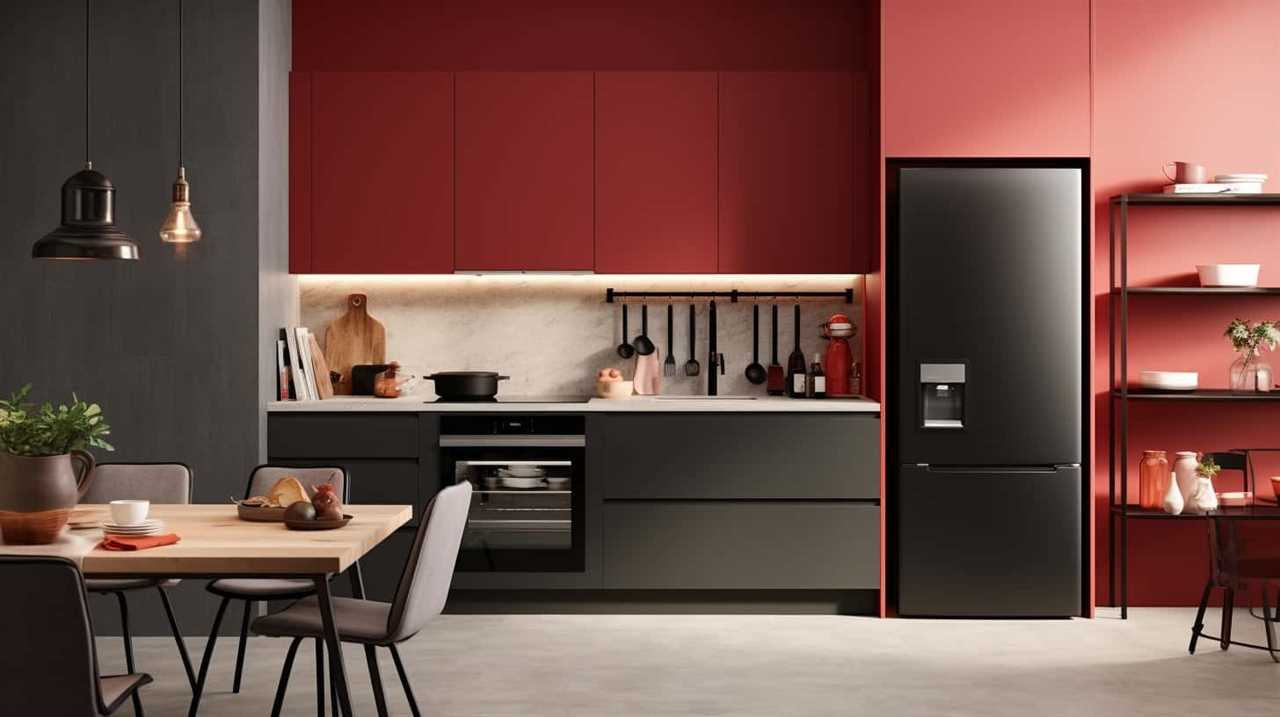
Factors to Consider Before Replacing Appliances
Before replacing appliances, there are several factors that we need to consider.
Evaluating the cost effectiveness is crucial in determining whether it’s worth replacing the appliances. This involves comparing the cost of purchasing new appliances against the potential increase in home value.
Additionally, it’s important to assess the impact on energy consumption. Upgrading to energy-efficient appliances can lead to lower utility bills and may be attractive to potential buyers.
Lastly, it’s essential to consider the overall condition and functionality of the existing appliances. If they’re still in good working condition and don’t significantly impact the aesthetics of the home, replacing them may not be necessary.

Understanding these factors will help homeowners make informed decisions about whether or not to replace their appliances.
Moving forward, let’s delve into understanding the current market trends.
Understanding the Current Market Trends
In our market research, we’ve observed a growing demand for homes with updated appliances. The current market demand reflects a shift in consumer preferences towards modern and energy-efficient appliances. Homebuyers are increasingly looking for properties that offer convenience and functionality, and having new appliances is a significant factor in their decision-making process.
Buyers are willing to pay a premium for homes with updated appliances as they perceive them to be of higher value and reduce the need for immediate replacements. Consequently, sellers who invest in replacing their appliances can expect a higher return on their investment.

Understanding the current market trends allows homeowners to strategically position their properties and attract potential buyers.
Now, let’s dive into the next section and evaluate the age and condition of existing appliances.
Evaluating the Age and Condition of Existing Appliances
When evaluating the age and condition of existing appliances, it’s important to consider their impact on the resale value of the home. Older appliances may not only affect the overall appeal of the property, but they can also raise concerns about potential maintenance and repair costs for potential buyers.
Impact on Resale Value
We evaluate the age and condition of existing appliances to determine their impact on resale value. When considering the impact of existing appliances on resale value, it’s important to take into account market trends and buyer preferences. Here are three key factors to consider:

- Age: Older appliances may have a negative impact on resale value, as buyers often prefer newer, more energy-efficient models.
- Condition: Well-maintained and fully functional appliances can positively influence resale value, as they provide buyers with peace of mind and reduce the need for immediate replacements.
- Style and Features: Appliances that align with current design trends and offer desirable features, such as smart technology or energy-saving options, can increase the overall appeal of a home and potentially boost its resale value.
Considering these factors, it becomes evident that the age and condition of existing appliances play a significant role in determining their impact on resale value.
Transitioning into the next section about ‘cost vs. benefits’, it’s crucial to weigh the potential increase in resale value against the cost of replacing appliances.
Cost Vs. Benefits
To determine the cost vs. benefits of replacing appliances, it is important to evaluate the age and condition of existing appliances. Conducting a cost benefit analysis allows homeowners to make informed decisions about whether it is worth investing in new appliances or if the existing ones still have long term value.
| Age of Existing Appliances | Condition of Existing Appliances | Cost Benefit Analysis |
|---|---|---|
| Less than 5 years | Excellent | Replacement may not be necessary as the appliances are relatively new and in good condition. Consider other factors such as energy efficiency and aesthetic appeal. |
| 5-10 years | Good | Replacement could be considered depending on the desired upgrade and the expected lifespan of the new appliances. Evaluate the cost of replacement against potential energy savings and increased home value. |
| More than 10 years | Poor | Replacement is recommended as older appliances may be less efficient and have higher maintenance costs. Consider the potential energy savings and the positive impact on resale value. |
Popular Appliance Upgrades That Add Value
One way to increase the value of your home is by upgrading popular appliances. By investing in energy efficient appliances, you not only save on utility bills but also make your home more appealing to potential buyers. These appliances are designed to use less energy while still providing the same level of performance.
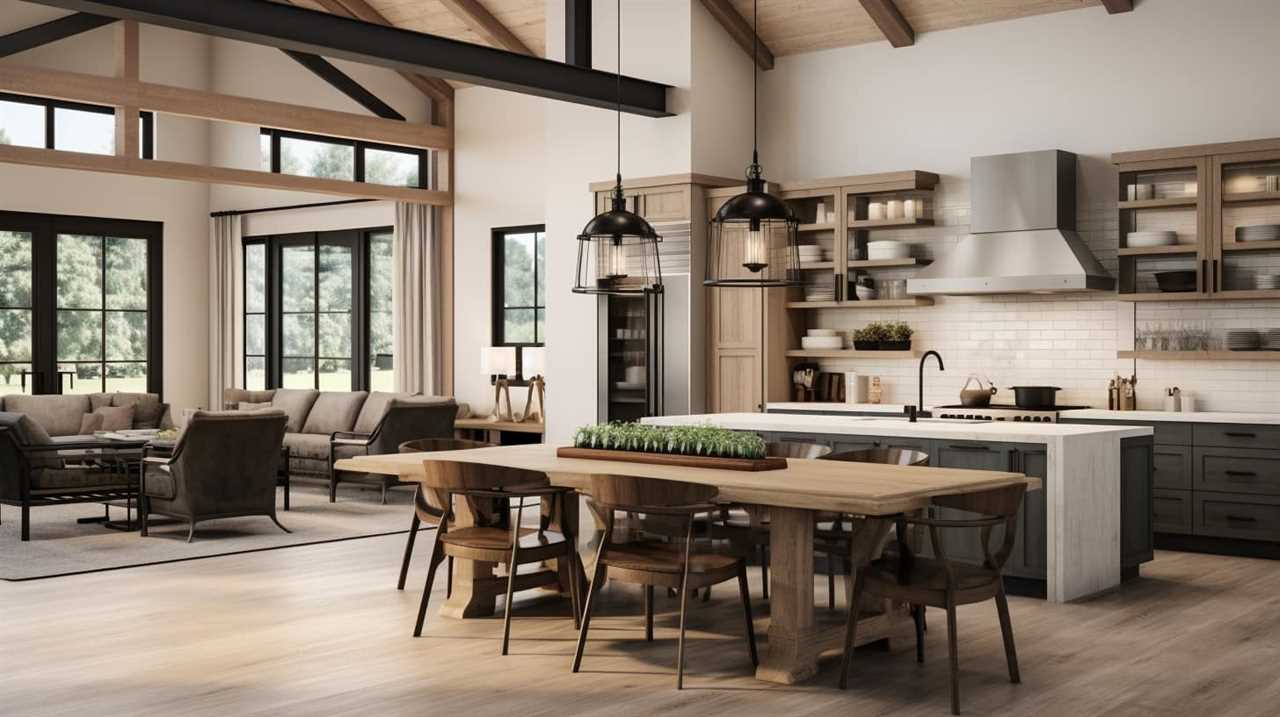
Smart home appliances, on the other hand, offer convenience and efficiency by allowing you to control and monitor them remotely. These appliances can be connected to your smartphone or home automation system, giving you the ability to adjust settings and receive notifications from anywhere.
Additionally, upgrading to stainless steel appliances can give your kitchen a modern and sleek look, which is highly desirable for buyers.
Cost Vs. Return on Investment for Appliance Replacements
When considering appliance replacements, it’s crucial to analyze the return on investment (ROI) to determine their cost-effectiveness. By evaluating the upfront cost of the upgrades against the potential increase in property value, homeowners can make informed decisions.
Additionally, understanding the impact that these replacements can have on the overall appeal and functionality of the home is essential in evaluating their worth.
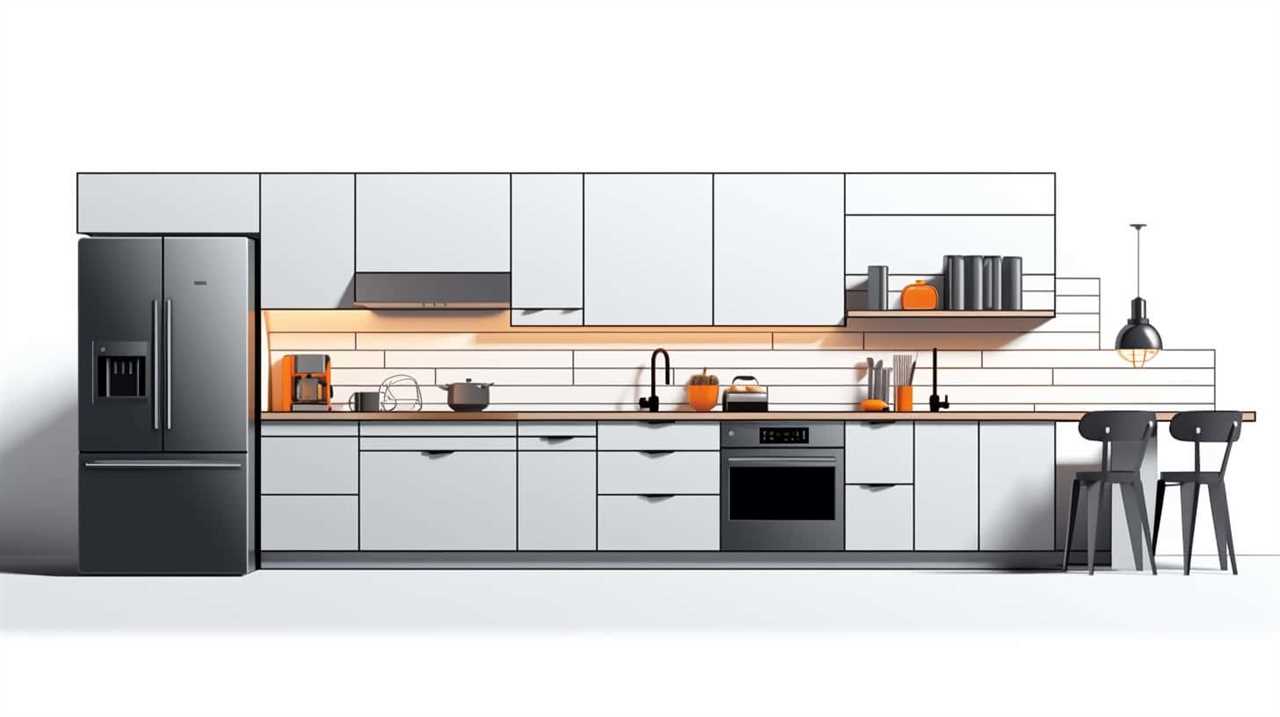
ROI of Appliance Replacements
We have found that replacing appliances can provide a significant return on investment, with an average cost-to-value ratio of 80%. This means that for every dollar spent on replacing appliances, homeowners can expect to recoup 80 cents in increased home value.
Conducting a thorough ROI analysis and cost benefit analysis is crucial in determining which appliances to replace and when. Here are three key factors to consider:
- Energy Efficiency: Upgrading to energy-efficient appliances not only saves homeowners money on utility bills but also appeals to buyers who are increasingly conscious of sustainability and energy conservation.
- Aesthetics: Outdated or worn-out appliances can make a home look dated and unappealing. Replacing them with modern, stylish options can significantly enhance the overall look and feel of the space.
- Functionality: Appliances that are no longer functioning properly or are outdated may deter potential buyers. Upgrading to appliances with advanced features and improved performance can increase the desirability and value of the home.
Cost-Effectiveness of Upgrades
To determine the cost-effectiveness of appliance upgrades, we analyzed the return on investment for replacing appliances in homes. We compared the cost of purchasing and installing new appliances with the potential savings on monthly utility bills. Our findings indicate that investing in energy-efficient options can have a significant impact on monthly utility bills. By replacing old, inefficient appliances with energy-efficient models, homeowners can reduce their energy consumption and lower their monthly expenses.
To illustrate this point, let’s take a look at the following table:

| Appliance | Cost of Replacement | Potential Savings on Monthly Utility Bills |
|---|---|---|
| Refrigerator | $1,200 | $15 |
| Washing Machine | $800 | $10 |
| Dishwasher | $700 | $8 |
As we can see from the table, the cost of replacing appliances can be recouped over time through the savings on monthly utility bills. This cost-effectiveness makes appliance upgrades an attractive option for homeowners looking to reduce their energy consumption and save money in the long run.
Considering the impact on monthly utility bills, the subsequent section will explore the connection between appliance upgrades and the overall impact on property value.
Impact on Property Value
How does replacing appliances affect the cost versus return on investment for property value? When it comes to evaluating the impact of appliance replacements on property value, there are several factors affecting market value that need to be considered. Appraisers take into account the quality, condition, and age of appliances when appraising property improvements. Here are three key considerations:
- Quality of appliances: Upgrading to high-quality appliances can increase the overall value of a property. Buyers are often willing to pay a premium for modern, reliable, and energy-efficient appliances.
- Condition of appliances: If the existing appliances are outdated or in poor condition, replacing them can significantly improve the appeal and value of the property. Buyers will be more inclined to pay a higher price for a home with well-maintained appliances.
- Age of appliances: Older appliances may not only be less energy-efficient but also more prone to breakdowns and repairs. By replacing them with newer models, homeowners can attract potential buyers and increase the perceived value of their property.
Considering these factors, replacing appliances can have a positive impact on the cost versus return on investment for property value. Moreover, it sets the stage for discussing the subsequent section about the impact of energy efficiency on home value.
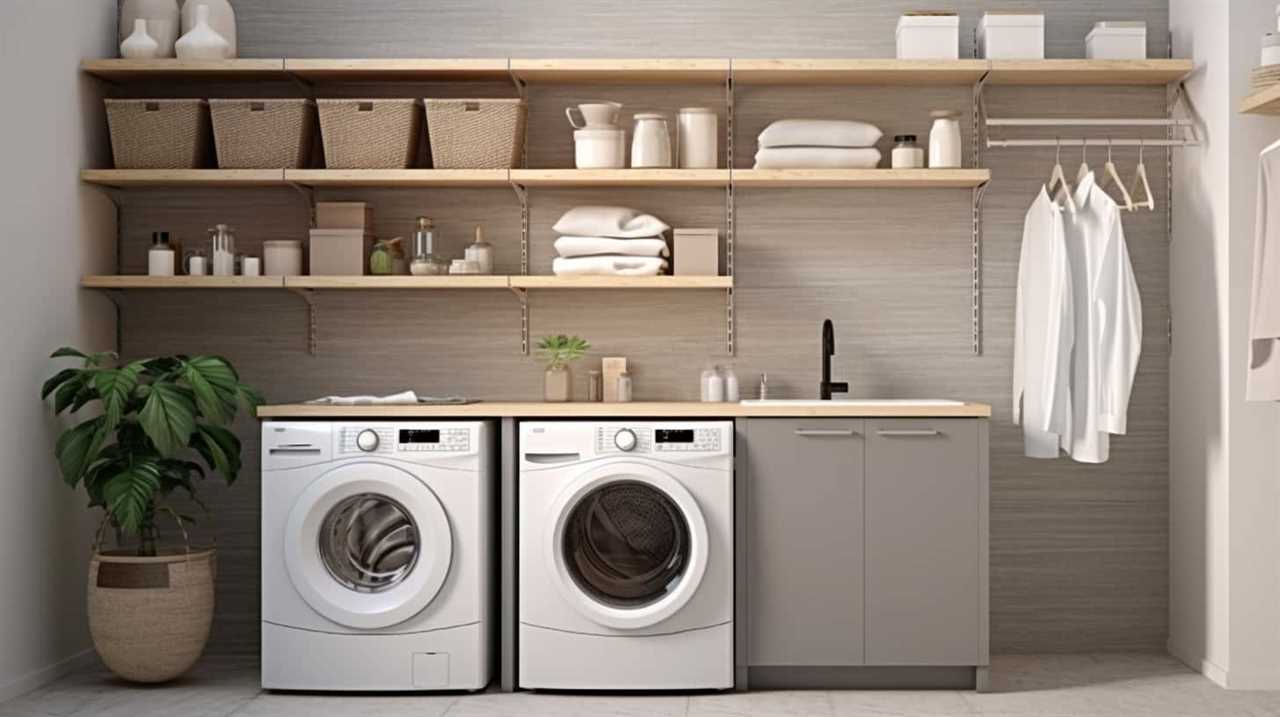
The Impact of Energy Efficiency on Home Value
Improving energy efficiency significantly impacts a home’s value. Energy efficient appliances and green home improvements not only contribute to a more sustainable environment but also offer financial benefits to homeowners.
Energy-efficient appliances, such as refrigerators, dishwashers, and HVAC systems, consume less energy, resulting in lower utility bills. These appliances are often equipped with advanced features like smart technology, allowing homeowners to monitor and control their energy usage.
Green home improvements, such as insulation, solar panels, and energy-efficient windows, enhance a home’s overall energy efficiency and reduce reliance on traditional power sources. This not only lowers energy costs but also increases the property’s desirability and marketability. Potential buyers are increasingly prioritizing energy efficiency, recognizing the long-term savings and environmental benefits it provides.
Thus, investing in energy efficiency upgrades can significantly enhance a home’s value.
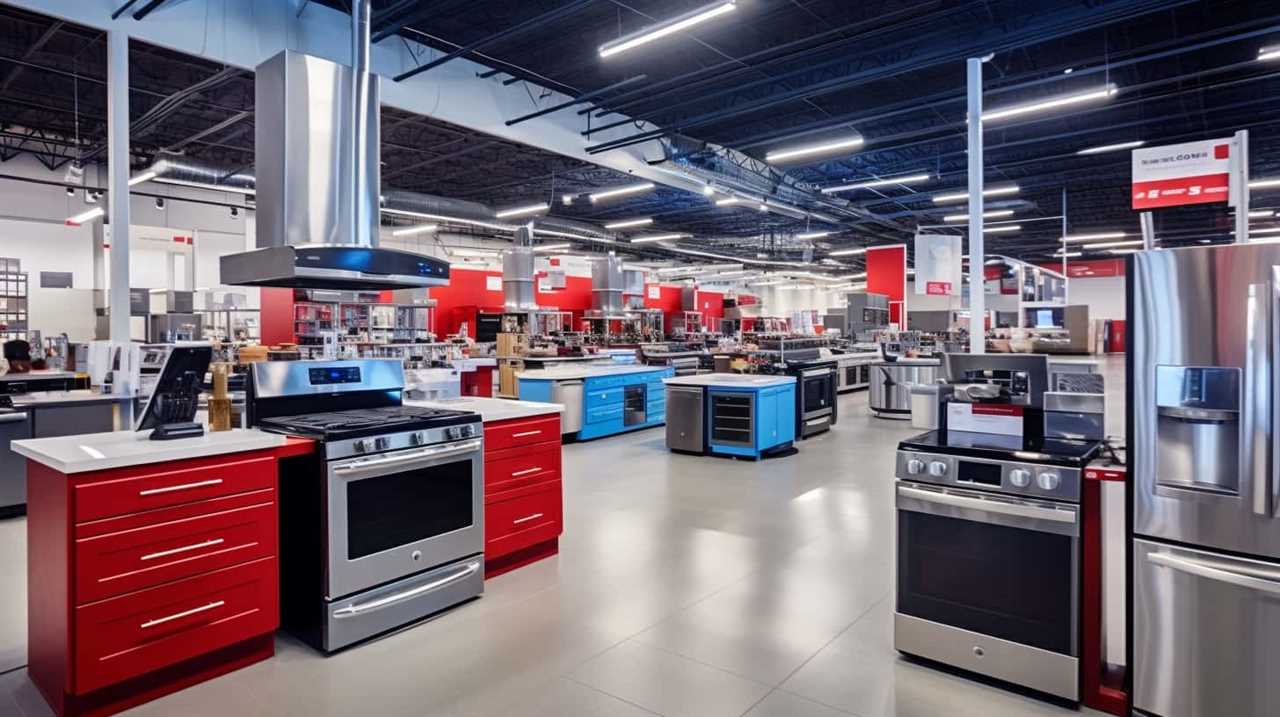
How to Choose the Right Appliances for Maximum ROI
When it comes to choosing the right appliances for maximum ROI, there are several key points to consider.
Firstly, understanding the ROI of appliance upgrades is crucial in determining which investments will yield the highest return. Factors such as energy efficiency, durability, and functionality can all impact the value that these upgrades bring to your home.
Additionally, it’s important to choose cost-effective options that align with your budget and provide the most value for your investment. Taking into account the initial cost of the appliance, as well as any potential savings in energy costs, can help you make an informed decision.
Lastly, consider the longevity of the appliance. Investing in a durable and reliable appliance may require a larger upfront cost, but it can save you money in the long run by reducing the need for repairs or replacements.
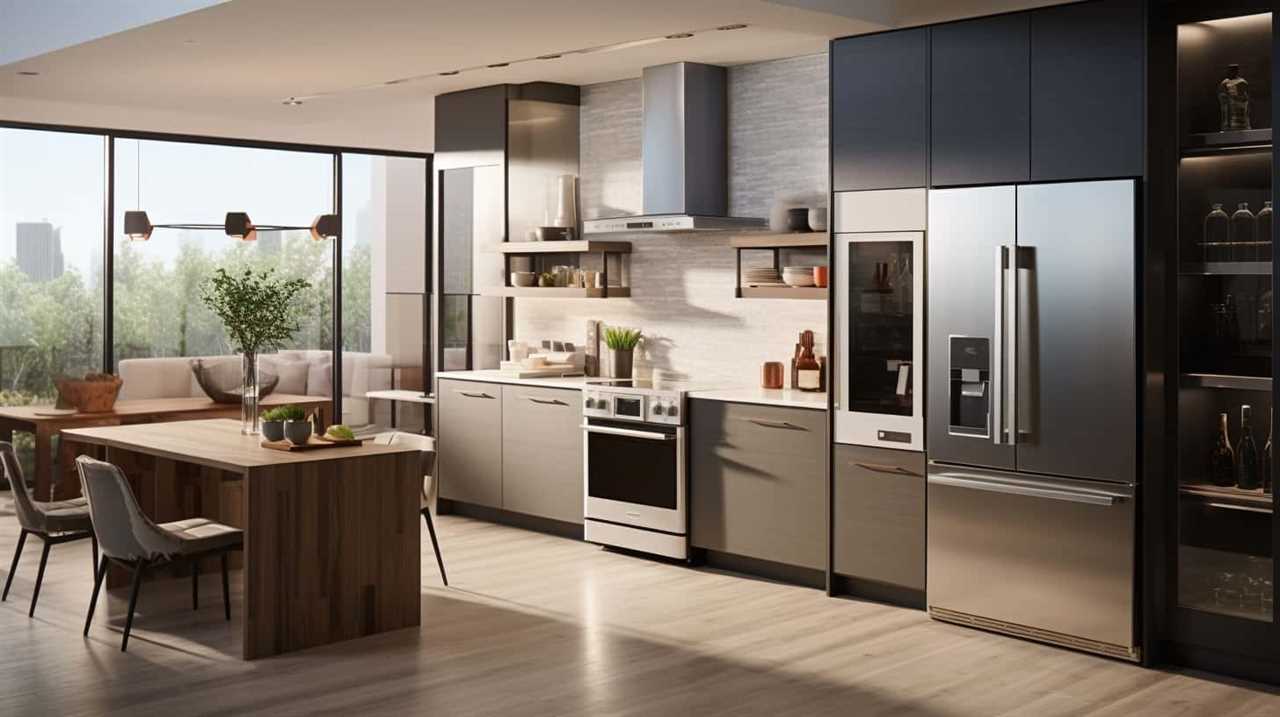
ROI of Appliance Upgrades
To maximize our return on investment (ROI), we carefully select appliances that offer the highest value and efficiency for our home. When considering the ROI of appliance upgrades, it’s important to take into account the cost of the upgrades and the potential energy savings.
Here are three factors to consider when choosing the right appliances for maximum ROI:
- Energy Efficiency: Opt for appliances that are Energy Star certified as they consume less energy, resulting in lower utility bills and long-term savings.
- Lifespan: Choose appliances with a longer lifespan as they’ll require fewer repairs and replacements, minimizing future expenses.
- Resale Value: Select appliances that are popular and in-demand among potential buyers, as this can increase the overall value of your home.
Factors Impacting Value
We frequently prioritize selecting appliances that offer the highest value and efficiency for our home to maximize our return on investment (ROI).
When considering the impact on home valuation, there are several factors that can affect the resale value of a property.

One important factor is the age and condition of the appliances. Outdated or malfunctioning appliances can significantly decrease the value of a home, as potential buyers may see them as an additional expense they’ll have to bear.
Energy efficiency is another key factor to consider. Appliances with high energy efficiency ratings not only save money on utility bills, but they also attract eco-conscious buyers who are willing to pay a premium for environmentally friendly features.
Additionally, the overall aesthetic appeal of the appliances, such as their design and finish, can also impact the perceived value of a home.
Choosing Cost-Effective Options
In our quest to maximize ROI, it’s crucial to choose cost-effective options when selecting appliances for our home. Here are three cost-saving options and energy-efficient choices to consider:

- Energy Star certified appliances: These appliances are designed to use less energy, which can result in significant savings on utility bills over time.
- Smart appliances: These appliances are equipped with advanced technology that allows for remote control and automation, helping to optimize energy usage and reduce costs.
- Energy-efficient HVAC systems: Upgrading to a high-efficiency heating, ventilation, and air conditioning system can lead to substantial energy savings and increased home value.
By selecting these cost-effective options, not only can you save money in the long run, but you can also enhance the value of your home.
Now let’s explore the role of appliance warranties in home appraisals.
The Role of Appliance Warranties in Home Appraisals
When considering the impact of appliance warranties on home appraisals, it’s crucial to understand their significance in determining property value.
Appliance warranties can provide several benefits that contribute to the overall value of a home. Firstly, they offer peace of mind to potential buyers, knowing that they’re protected against unexpected appliance failures. This can increase the perceived value of the property and make it more appealing in a competitive market.

Additionally, appliance warranties can also transfer to the new owner, offering continued coverage even after the sale.
However, it’s important to be aware of the limitations of warranty coverage. Some warranties may have exclusions or restrictions that limit the types of repairs or replacements covered. It’s essential to carefully read and understand the terms and conditions of the warranty to fully assess its impact on the home’s appraisal value.
Leveraging Appliances for a Competitive Edge in the Market
To gain a competitive edge in the market, homeowners can leverage their appliances. By strategically showcasing their appliances, homeowners can attract potential buyers and command a higher price for their property. Here are three ways homeowners can use their appliances to their advantage:
- Highlight energy-efficient appliances: With the growing emphasis on sustainability, energy-efficient appliances can be a major selling point. Homeowners can showcase their appliances’ energy-saving features to appeal to environmentally conscious buyers.
- Offer competitive pricing: In a competitive market, pricing plays a crucial role. Homeowners can leverage their appliances by offering competitive pricing that includes the value of the appliances. This can attract buyers who are looking for a good deal and are willing to pay a premium for upgraded appliances.
- Incorporate effective marketing strategies: Effective marketing strategies can make a significant difference in selling a home. Homeowners can use high-quality photographs, virtual tours, and detailed appliance descriptions to highlight the value and functionality of their appliances.
By leveraging their appliances through competitive pricing and effective marketing strategies, homeowners can stand out in the market and maximize their home value.

Now let’s explore alternative ways to boost home value without replacing appliances.
Alternative Ways to Boost Home Value Without Replacing Appliances
We can explore other methods to increase home value without the need to replace appliances. When it comes to home improvement, one effective way to boost home value is by enhancing curb appeal. The exterior appearance of a house plays a significant role in attracting potential buyers and increasing the overall value of a property.
Simple upgrades such as landscaping, fresh paint, and a well-maintained lawn can make a huge difference. Adding a front porch or improving the existing one can also enhance the curb appeal and create a welcoming entrance. Additionally, installing outdoor lighting, updating the front door, and repairing any visible damages can further improve the overall appearance of the home.
Frequently Asked Questions
Are There Any Tax Incentives or Rebates Available for Replacing Appliances?
Tax benefits and rebates may be available for replacing appliances with energy-efficient options. These incentives can help offset the cost of upgrading and contribute to long-term savings on energy bills.

What Are Some Alternative Ways to Increase Home Value Without Replacing Appliances?
Improving home value without replacing appliances can be achieved through various home renovation ideas. Enhancing curb appeal by landscaping, repainting, or adding outdoor lighting can make a significant impact on property valuation.
How Can Energy-Efficient Appliances Impact Monthly Utility Bills?
Energy-efficient appliances can have a significant impact on monthly utility bills. They not only reduce energy consumption but also contribute to environmental sustainability. Additionally, they provide long-term cost savings, making them a wise investment for homeowners.
What Are Some Popular Appliance Upgrades That May Not Necessarily Add Value to a Home?
Appliance upgrades can be popular trends, but not all of them necessarily add value to a home. It’s important to consider the specific upgrades and their potential impact on the overall value of the property.
Are There Any Specific Appliances or Brands That Are Known to Have a Higher Return on Investment When Replaced?
When it comes to specific appliance brands, there are some that have a higher return on investment when replaced. To maximize ROI, consider energy-efficient options and appliances that are in high demand.

Conclusion
In conclusion, replacing appliances can significantly increase the value of a home. By considering factors such as the current market trends, age and condition of existing appliances, and popular upgrades, homeowners can choose the right appliances that offer maximum return on investment.
Additionally, leveraging appliance warranties and exploring alternative ways to boost home value can provide a competitive edge in the market.
So, don’t underestimate the impact of up-to-date appliances when it comes to enhancing the value of your home.




